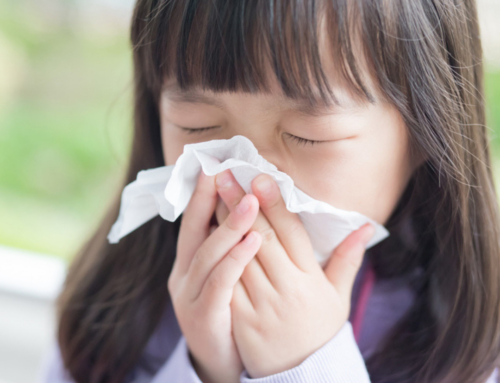As an adult, do you find yourself asking “why do I suddenly have allergy symptoms?”. Unfortunately, allergies usually start early in life with most people showing symptoms in childhood or young adulthood. It is therefore a surprise to adults when they suddenly develop symptoms such as:
- itchy skin
- watery eyes
- runny nose
- sneezing
- skin rashes
- stomach cramps
- vomiting.
But, what causes allergies to develop? A family history of allergies will predispose you to develop allergies at any age but environmental factors should be taken into consideration with adult-onset allergies. The reason for sudden allergy symptoms is a common chemical found in the body called histamine, which often necessitates the use of an antihistamine.
Why Do I Have Allergies All of a Sudden?
Can you suddenly become allergic to something? Unfortunately, the answer is yes and here’s why: Histamine.
Histamine is a chemical found in the body which is responsible for many of the uncomfortable symptoms of allergies. Yet it has many important functions in the body. It can be considered a ‘communication’ molecule sending signals throughout the body. Here are some examples of the positive roles that histamine plays:
- It stimulates your stomach to produce stomach acid which helps you break down food
- It stimulates inflammatory reactions so that the immune system can do its job of fighting off invaders such as parasites.
- It promotes wakefulness in the brain.
So, is it possible to develop allergies this way? Each time your body produces histamine in response to inflammation, the body requires enzymes to break that histamine down. If your body is in a state of constant inflammation or if you lack specific enzymes, the burden of histamine increases, and you may begin to show signs of allergies. The burden of histamine rises as we age.
Factors that Lead to Increased Histamine Production
When histamine overproduction occurs, we see the body respond inappropriately to the environment; it starts to recognize some benign substances as invaders or ‘allergens’. These include common things like pollen, dust, cats or dogs. If histamine continues to rise, individuals may find themselves experiencing more and more allergies or food intolerances. This can be aggravated by a number of factors.
Diet
There are foods which naturally contain histamine and those that stimulate histamine release.
Foods that contain high histamine include fermented foods like dairy, sauerkraut or alcohol, smoked foods or preserved foods like processed meat or dried fruit, meat or fish stored for too long in the fridge, avocados, eggplant, tomatoes, and shellfish.
Foods that stimulate the release of histamine, like citrus, papaya, pineapple, strawberries, banana, alcohol, nuts, preservatives, food dyes, MSG and chocolate.
Foods that contain other ‘amines’ like tyramines and histidines.
Nutrient Deficiency
Certain nutrients are involved in preventing inflammation in the body or in the production of the DAO enzyme. Vitamin D, Vitamin C, Vitamin B6, Zinc and Magnesium deficiency can contribute to allergenic symptoms if deficient. This is why it’s so important to speak to an experienced holistic professional to keep your health in check.
Enzyme Deficiency
The enzyme responsible for most histamine breakdown in the body is Diamine Oxidase
Or ‘DAO’. DAO levels can be affected by medications, inflammatory bowel conditions, bacterial or parasitic overgrowth in the gut, foods that block DAO production like alcohol and caffeinated beverages or a high histamine burden.
Digestive Health
The gut is a focal point for histamine intolerance. Histamine intolerance is thought to arise mostly from the gut where the DAO enzyme works to break down histamine. High levels of histamine in the gut are linked to gut motility (diarrhea and constipation), stomach acid (reflux) as well as other Irritable Bowel Symptoms.
While the gut helps to break down histamine, it is also responsible for producing histamine through the metabolic activity of gut bacteria. Certain bacteria produce more histamine; therefore, a balanced spectrum of bacteria in the gut is important.
Hormonal Health
Allergenic symptoms can change through the menstrual cycle. Estrogen levels are problematic here. Estrogen can trigger the release of histamine and histamine acts together with estrogen to amplify oestrogenic excess symptoms.
Environmental Toxins
Can you develop allergies from the environment? Yes, other environmental factors can also stimulate inflammation which in turn will promote more histamine production. Mold is a perfect example of this. Other environmental factors include heavy metals, chemical exposures, improperly ventilated living, or workspaces.
Stress
Stress produces inflammation which stimulates the release of more histamine. Excess histamine, in turn, acts like a neurotransmitter and can increase feelings of anxiety or depression.
How do allergies develop? It could be any of the factors above. A naturopathic holistic approach to sudden-onset allergies aims to address allergies by supporting:
- Low histamine diet
- DAO enzyme support
- Screening and treating for nutrient deficiency
- Investigation of the gut microbiome
- Hormonal balance
- Investigation of environmental factors
- Stress reduction
Identifying and Treating Your Allergies
It’s not always clear why some people develop allergies later in life, while others don’t. Allergies can start at any age and may be triggered by a variety of factors, including environmental allergens, food allergies, and even pet dander. If you find yourself wondering “why do I suddenly have allergy symptoms?”, don’t stress – our team of holistic naturopathic professionals at Innate Wellness are here to help. Contact us today to schedule an appointment and take the first step toward allergy relief.





